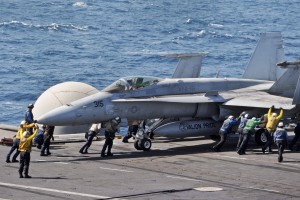Special to WorldTribune.com
WASHINGTON — The United States, its troops under direct threat, has begun air strikes on Islamic State of Iraq and the Levant in northern Iraq.
Officials said the U.S. Air Force launched limited air strikes on ISIL on northern Iraq. They said the air strikes, ordered by President Barack Obama, were meant to block ISIL’s advance toward the Kurdistan capital of Irbil, where some 150 U.S. soldiers were deployed.

“As the president made clear, the United States military will continue to take direct action against ISIL when they threaten our personnel and facilities,” Defense Department spokesman John Kirby said.
In a statement on Aug. 8, Kirby said the first strike consisted of two F/A-18 Super Hornet fighter-jets, which dropped two 500-pound laser-guided bombs on an ISIL mobile artillery piece near Irbil. He said ISIL used the artillery to shell a U.S. military facility in Irbil.
This marked the first U.S. combat operations in Iraq since the withdrawal in 2011. Over the last month, the U.S. military sent about 800 special operations forces and established two joint operations centers in Iraq, one of them in Irbil. The JOCs were meant to monitor ISIL’s sweep through northern Iraq and help select targets for the Iraqi military.
The ISIL advance toward Irbil was said to have surprised the U.S. intelligence community. Officials acknowledged that they overestimated Kurdish capabilities to defend their autonomous region and underestimated ISIL’s military skills.
“They [ISIL] acted with tremendous military proficiency,” a senior official said.
Hours later, the U.S. Air Force conducted a second round of air strikes on ISIL. The Pentagon said an unmanned aerial vehicle struck an ISIL mortar position while four F/A-18s struck an ISIL convoy near Irbil.
“When ISIL fighters returned to the site moments later, the terrorists were attacked again and successfully eliminated,” Kirby said.
The Pentagon has also directed resupply efforts for the U.S. military contingent in Irbil. On early Aug. 10, a C-17 and two C-130 air transports dropped 72 pallets, including 5,300 gallons of fresh drinking water and 85,00 pre-packaged meals. Obama said the supplies were meant for tens of thousands of Yezidi refugees trapped in a mountain near Sinjar.
“We intend to stay vigilant and take action if these terrorist forces threaten our personnel or facilities anywhere in Iraq, including our consulate in Irbil and our embassy in Baghdad,” Obama said. “We’re also providing urgent assistance to Iraqi government and Kurdish forces so they can more effectively wage the fight against ISIL.”
Officials did not rule out an ISIL offensive on Baghdad, where the bulk of the U.S. military presence was located. They said a likely target could be Baghdad International Airport, which contains scores of U.S. military aircraft.
“I don’t think we’re going to solve this problem in weeks,” Obama said. “This is going to take some time.”

You must be logged in to post a comment Login